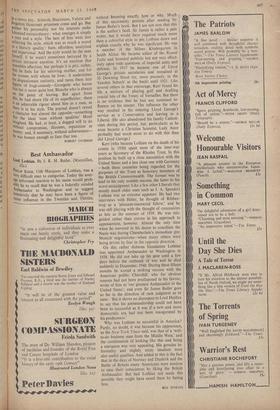Best Ambassador
PHILIP KERR, 11th Marquess of Lothian, was a very difficult man to categorise. Today the aver- age informed reaction to his name would prob- ably be to recall that he was a federally minded Ambassador to Washington and to suggest tentatively that he may have been a figure of some influence in the Twenties and Thirties, without knowing exactly how or why. Much of this uncertainty persists after reading Sir James Butler's book. But I am not sure that this is the author's fault. Sir James is rather a pale writer, but it would have required much more than a colourful style to pin Lothian down and explain exactly why he was significant. He was a member of the Milner Kindergarten in South Africa. He became editor of the Round Table and brooded publicly but not very effect- ively upon wide questions of imperial unity and defence. In 1917 he became one of Lloyd George's private secretaries and remained at 10 Downing Street (or, more precisely, in the 'Garden Suburb' at the back) until 1921. Like several others in that entourage, Kerr found his life a mixture of playing golf and drafting crucial bits of the Treaty of Versailles. But there is no evidence that he had any sustained in- fluence on his master. The influence the other way resulted in his entering Lloyd George's service as a Conservative and leaving as a Liberal. (He also abandoned his family Catholi- cism during this period, but, particularly as he soon became a Christian Scientist, Lady Astor probably had much more to do with this than did Lloyd George.) Kerr (who became Lothian on the death of his cousin in 1930) spent most of the inter-war years as Secretary of the Rhodes Trust. In this position he built up a close association with the United States and a less close one with Germany —both these countries being regarded for the purposes of the Trust as honorary members of the British Commonwealth. The former was to lead to his only notable success, the latter to his worst misjudgment. Like a few other Liberals (but mostly much older ones such as J. A. Spender) Lothian was an extreme appeaser. He had two interviews with Hitler, he thought of Ribben- trop as a 'pleasant-mannered fellow,' and he was still playing with the thought of concessions as late as the summer of 1939. He was mis- guided rather than craven in his approach to appeasement, however. Almost the only time when he wavered in his desire to conciliate the Nazis was during Chamberlain's immediate pre- Munich negotiations—when many others were being driven by fear in the opposite direction.
On this rather dubious foundation Lothian was appointed Ambassador to Washington in 1938. He did not take up his post until a few days before the outbreak of war and he died suddenly in December, 1940. During these fifteen months he scored a striking success with the American public. Churchill, who for obvious reasons had not been predisposed in his favour, wrote of him as 'our greatest Ambassador to the United States'; and even Sir James Butler goes so far in the direction of rash judgment as to state : 'But it shows no disrespect to Lord Halifax to say that his ambassadorship could not have been as successful as it was if a new and more democratic era had not been inaugurated by his predecessor.'
Why was Lothian so successful in America? Partly, no doubt, it was because his appearance, as the New 'York Times said, was that of a 'well- to-do business man from the Middle West,' and the combination of looking like this and being a marquess was very appealing. His genuine in- formality and slightly misty idealism were also useful qualities. And added to this is the fact that in the days of Norway and Dunkirk and the Battle of Britain many Americans were anxious to ease their consciences by liking the British Ambassador. But had Lothian not made this- possible they might have eased them by hating him.
ROY JENKINS


















































 Previous page
Previous page